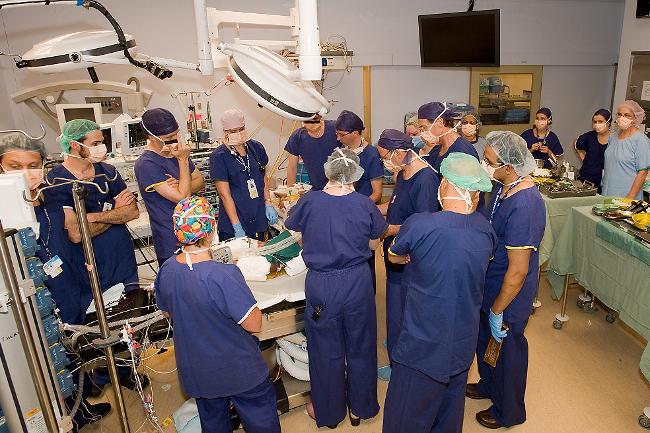Surgeons separate conjoined twins
SURGEONS described the moment they separated conjoined twins Krishna and Trishna as "surreal" and are now fitting them with plastic skulls.
SURGEONS have described the moment they separated the conjoined three-year-old Bangladeshi twin girls this morning as "surreal" but say they still have a long way to go.
Dr Leo Donnan, chief of surgery at Melbourne’s Royal Children's Hospital, announced to reporters this afternoon that they finished separating the pair after 25 hours of surgery at 11am.
After more two years of planning for the complex surgery, Mr Donnan said his team of 16 doctors and nurses found it amazing to finally see the girls as two separate children.
But the team of neurosurgeons who were leading the marathon surgery will now step aside and let the plastic surgeons build them new skulls.
"At 11am this morning, the teams managed to separate their brains and they are very well," he said. "Now we have the long task of the reconstruction surgery which will take many hours."
Dr Donnan said it did not know how long the rest of the operation would take but said medical staff were thrilled they had managed to separate the brains of the twins.
"The moment of separation was a rather surreal moment, it was a relief," he said. "But everyone realises there is still a long way to go and the girls have a difficult time ahead of them."
"For the hospital, it is an historic moment and for the girls, an even more historic moment.''
Once the surgery was completed, Mr Donnan said Krishna and Trishna would remain in the hospital's intensive care unit (ICU) for "a number of days''.
"And then they'll be slowly woken up,'' he said.
The operation went for longer than would have been expected, Mr Donnan said.
He said the staff had taken planned breaks and the twins were well nourished before the operation.
The mood inside the operating theatre had changed following the separation, Mr Donnan said.
"It's been a very nice stage to move into,'' he said with a smile.
Shortly after their birth on December 22, 2006, their mother placed the twins in a Dhaka orphanage where two Australian volunteers, Danielle Noble and Natalie Silcock, realised the severity of their plight.
Ms Noble and Ms Silcock began fundraising and, along with Atom Rahman from the Children First Foundation, took the first steps to bring the sisters to Melbourne.
Margaret Smith from the Children First Foundation was trying to contain her joy at the separation of the twins, who had been joined at the head.
"We are taking it step by step - we don't want to get too excited, but I must say it's a very big step we have come to,'' Ms Smith said.
She said the girls' guardian Moria Kelly was "absolutely amazed''.
"It's been a very stressful time ... we have the next step to go through, getting the girls into ICU and getting them stabilised.
"It's a long process.''
- With AAP




